
Living for Change is a weekly newsletter that provides the perspective and activities of the Boggs Center and related organizations. Thinking for Ourselves is a weekly column exploring issues in Detroit and around the Country. The column was originally published in the Michigan Citizen.

Better or worse
I was not surprised by the Trump victory. I had prepared myself for what I thought would be a long, contested election. I imagined we would face a situation much like in 2016 where Trump would lose the popular vote, but carry the Electoral College. I was prepared for any number of tricks, from Trump’s secret plans to violence at the ballot boxes.

Being watchful
This week the Coalition for Police Transparency and Accountability (CPTA) and Urban Praxis joined with other community groups to discuss police surveillance in Detroit. People gathered to share information and ideas about the extent and effectiveness of surveillance techniques used by the Detroit Police.
Several key ideas emerged:

Isolation or military might?
A fair argument can be made that Donald Trump is an isolationist. But he is not against war. Isolationism is one of the longest standing political philosophies in the U.S. and has attracted people from the far right to those who identify as progressive anti-capitalists.
Often drawing its roots from George Washington’s Farewell address warning against entanglements in Europe, the 1920’s and 1930’s saw an expansion of the ideas. The experiences of World War I led to the understanding that Americans had been pushed to war by bankers and industry who profited from dealing in death. The 1934 publication of Merchants of Death, followed by War is a Racket in 1935 gave isolationism a strong anti-capitalist sentiment.

American fascists
Early this week Kamala Harris said it was fine with her to describe Donald Trump as “fascist.” By the end of the week, she had been joined by Gen. Mark A. Milley, Hillary Clinton, and Liz Cheney. The use of the term fascist to describe Trump’s peculiar brand of politics moved J.D. Vance to object. Vance said it was an incitement to violence. Vance, of course, raises no such objections when Trump flings the term at Harris.
We should all welcome this political clarity in describing Trump. Many of us remember that efforts to use the term fascist in 2016 were met with derision. We were accused of overreacting and diminishing the real horrors of fascism.
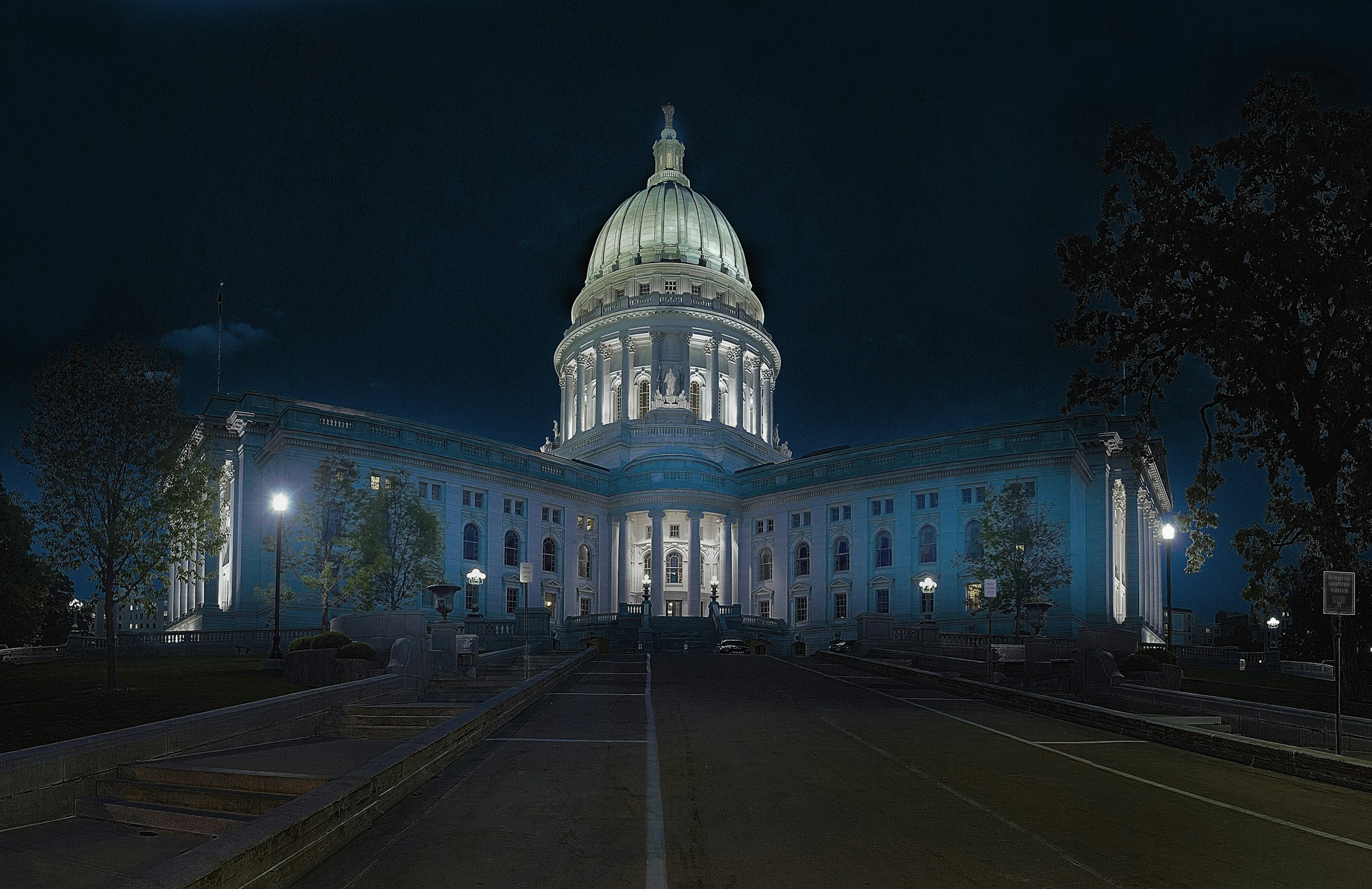
Truth telling
This election cycle reveals the deep divide in the U.S. No matter who wins in November, those of us who are concerned about creating a better world have a lot of work to do. Fully half the people in our country has embraced candidates who vilify other human beings, support draconian laws assaulting basic human rights, and speak glibly of executing political rivals. Rambling falsehoods and dark descriptions of daily life abound at rallies and in what passes for news coverage in an ever partisan and fragmented media world.
It is easy to think that Donald Trump is the source of these problems. Certainly, he has taken conspiracy theories and outright lying to new dimensions. He has promoted the “Big Lie” that the previous election was stolen from him and he persistently denies facts. At the same time his crude, coarse, bullying makes him a good target for our frustrations and fears.

Just peace
The world has witnessed one year of escalating barbarism. Each day we are moving closer to global destruction. In response, people are gathering to demand a cease fire and a US arms embargo on Israel. We are longing for a just path to peace. Yet those in authority continue to justify death and destruction.
The U.N. Secretary-General, António Guterres, issued a sober assessment of where the world stands today. He began by repeating his “utter condemnation” of the attacks by Hamas and the taking of hostages saying, “nothing can justify such acts.” He then concluded:
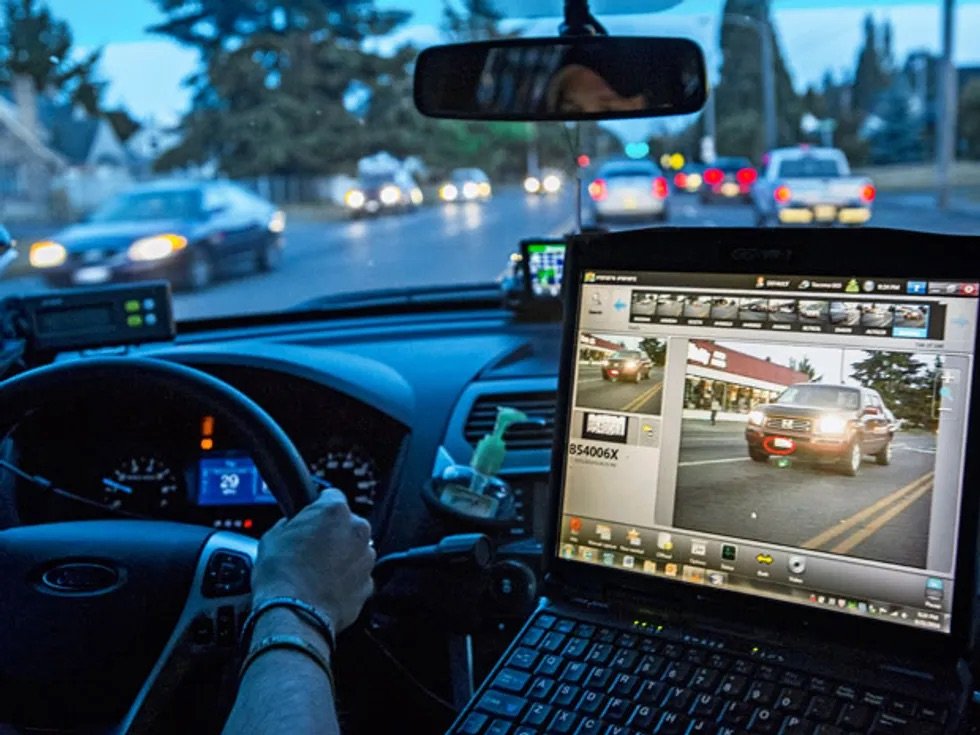
Police dangers
The dangers of Detroit’s unaccountable police department were on display this week. In a saga that is becoming all too familiar, the reliance on an expensive technology led to the detention of a young woman, the traumatizing of her small son, and the costly disruption of her daily life. In this case, Isoke Robinson was attacked by a SWAT team while sitting in her car with her son on a warm night, using the air conditioning to lessen the impact of the heat.
The police had deduced her car was involved in a non-fatal drive by shooting. They found her car by depending on expensive license plate reader technology. There was no evidence that Ms. Robinson’s car, or Ms. Robinson, had any connection to the shooting. Ms. Robinson is now suing the city for unreasonable seizure, intentional infliction of emotional distress, false imprisonment and negligence. She and her son still experience distress from the incident.
This is one of many from a growing list of police abuses of technology. As a recent article in the Detroit Free Press commented:

Challenging empire
This week marks the 23rd anniversary of the attack by Al Qaeda hijackers crashing two planes into the Twin Towers in New York, the Pentagon, and a field in Pennsylvania. Kamala Harris and Donald Trump both attended the ceremonies commemorating those lost.
This year the ceremony in New York took place not only against the backdrop of one of the most crucial elections ever facing this country, but in the context of growing movements for peace, challenging the military might of US empire. These movements, fueled by the courageous challenges to US military support of Israel, are the first real questionings of US military power since 9/11. Public attitude and polices combined in the aftermath of the attacks to effectively silence criticism of US corporate greed and use of military force to advance state interests. These movements today are challenging the powers of government to attack those whose conscience moves them to object to US policies. And they are challenging concept of the US military empire.
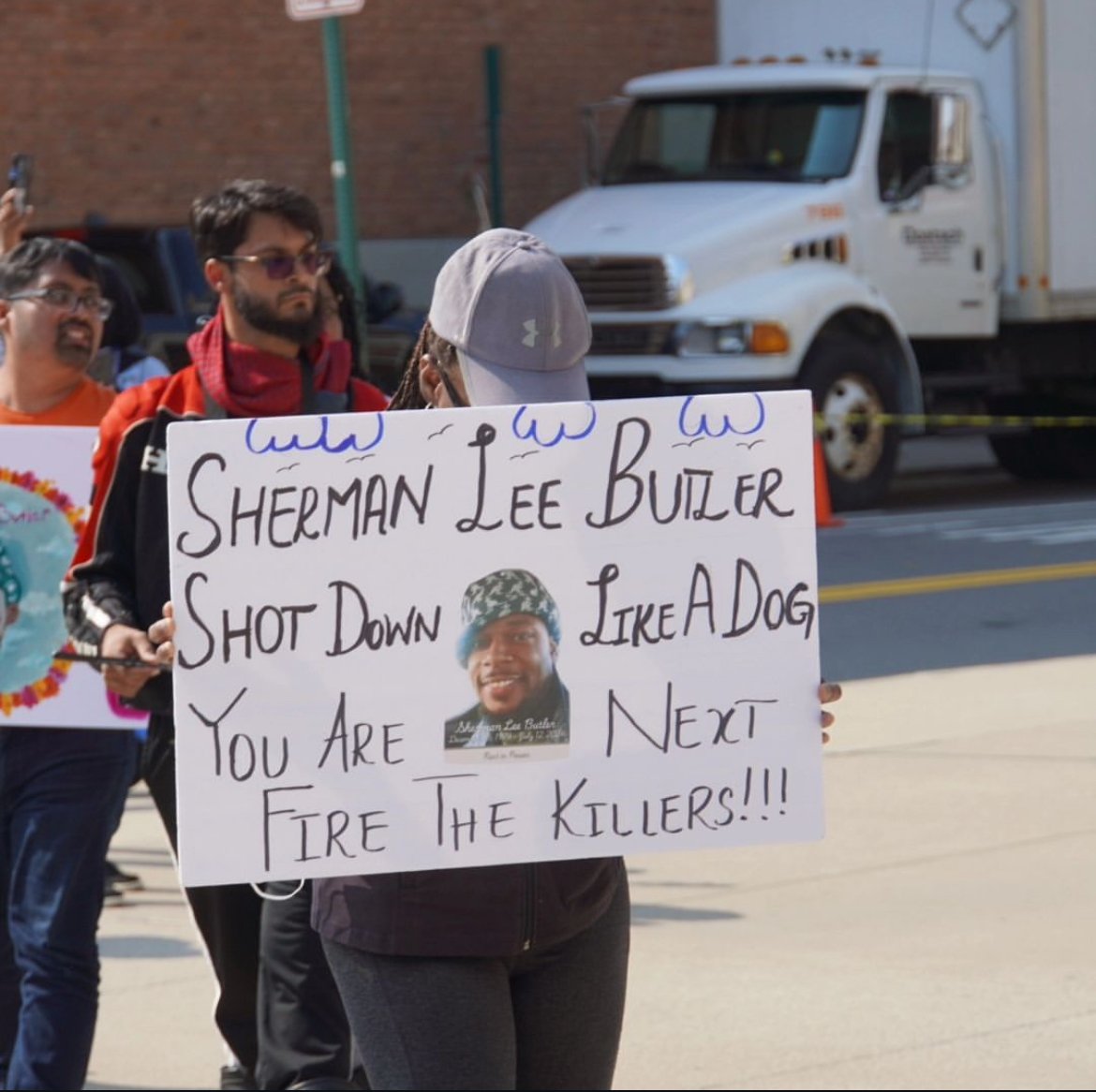
Justice for Sherman Lee Butler
The Justice Coalition held a demonstration this week to increase the pressure on the Detroit Police Department to release the body camera images that were taken at the time of Sherman Lee Butler’s death, allegedly from shots fired by a bailiff from the 36th District Court.
In the month since his death, only the broad contours of the case have been established. On July 12th a bailiff attempted to evict Mr. Butler. The bailiff forced his way into Mr. Butler’s apartment in Palmer Park. At some point police were called. The police attempted to subdue Mr. Butler with a taser. The bailiff shot his gun several times, killing Mr. Butler. The DPD was slow to identify Mr. Butler. They have refused to release body camera images that would enable the public to understand how an eviction led to the death of man obviously in need of support. The DPD has rejected inquiries from members of the Board of Police Commissioners, Mr. Butler’s family, and community advocates for transparency and accountability.

Lessons from the Rev.
I was profoundly moved by the appearance of the Reverand Jesse Jackson at this year’s democratic convention. The Democratic Party and the country are better because of him. As Rep. Pramila Jayapal (D-Wash.) said, “The progressive caucus arose from the vision of Jesse Jackson.” He paved the way for Barack Obama and made space for Kamala Harris. His two-time run for the presidency brought a deeper understanding to the country of the dignity of those who had been locked out, locked up, despised and disrespected. His 1984 speech to the Convention, “Our Time Has Come” speech stands out as a compelling vision of the values essential for a living democracy.

Unheard voices
The Democratic National Convention was filled with energy and hope for a better future. There was a recognition that we are facing historic choices with far reaching consequences. In her acceptance speech Kamala Harris named the moment saying:
“With this election, our nation has a precious, fleeting opportunity to move past the bitterness, cynicism and divisive battles of the past. A chance to chart a new way forward. Not as members of any one party or faction, but as Americans.”
The convention offered thoughtful, rousing, courageous, and often playful comments about the choices in front of us.
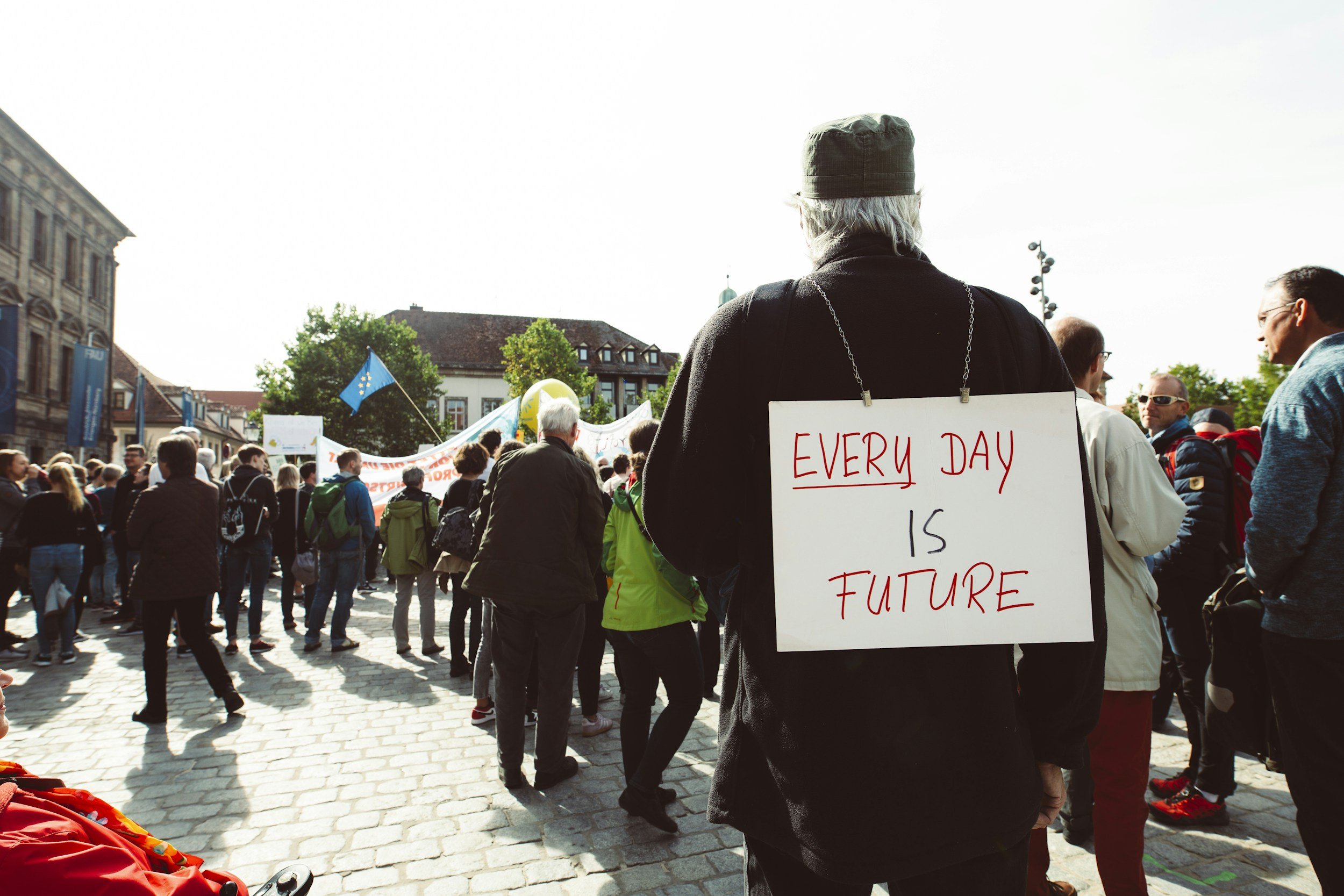
From rhetoric to action
This week much of the country will be watching the Democratic National Convention unfold in Chicago. For many people the parallels to the 1968 convention are unmistakable. It is a vivid reminder that public demonstrations matter. And that they are rarely welcomed by those in authority.
In 1968, demonstrations fueled by a desire for dignity at home and peace in Vietnam forced an incumbent president to withdraw from the presidential campaign. The nation was deeply divided over an increasingly unpopular administration and demonstrations demanding peace were growing stronger and more vocal. The Chicago Police Department was well known for its anti-democratic, violent use of force. The ultimate selection of Vice President Hubert Humphrey as the candidate was an effort to transcend these differences. Humphrey was defeated by Richard Nixon, who went on to continue war policies and to crack down on demonstrations.

Joyful possibilities
In the midst of political exuberance in the US as the Harris-Walz campaign gains momentum, much of the world is bracing for an escalation in the ongoing war in the middle east. The possibility of a cease fire in Gaza has been greatly diminished by the recent killings of top leaders of Hamas and Hezbollah by the Israeli government.
Ismael Haniyeh, the chief negotiator of Hamas for a cease fire was killed while in Tehran attending festivities surrounding the presidential inauguration of Masoud Pezeshkian. Just hours after his murder, Iran’s supreme leader, Ayatollah Ali Khamenei, issued an order to strike Israel in retaliation.
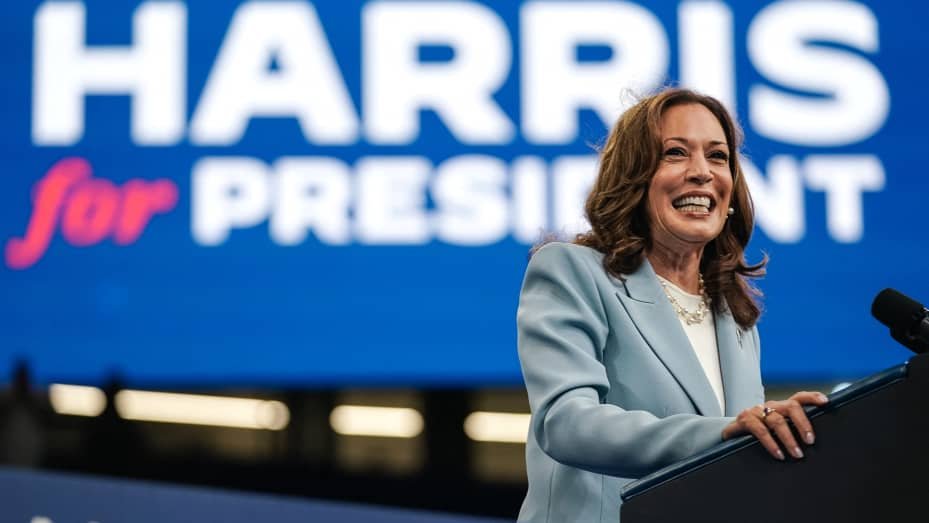
Military empires
The candidacy of Kamala Harris for President of the United States has excited young voters. In a few short days after announcing her candidacy, polls showed a surge in her popularity with people aged 18 to 30. Harris jumped 20 points above Joe Biden’s previous rating. She is leading Donald Trump by 24 points, 53 percent to 29. This is especially true in swing states.
For all of these young voters, this will be the first Presidential election in their lifetimes when the US has not been engaged in open warfare. Yet never in their lifetimes have we been closer to global war or nuclear holocaust. Never have we faced more critical questions about the role of our government in supporting military violence and terror.
In this election, in the midst of global conflicts, we have the opportunity to reassess our relationships to other people and the planet.

Persistent patterns
This week the Coalition for Police Transparency and Accountability (CPTA) brought together people who had been experiencing police violence to tell their stories. When these stories are woven together a clear pattern of police aggression emerges. Police, under the direction of the Mayor and the Chief of Police are routinely violating individual rights and threatening the fabric of democratic discussion.
Yvonne Jones of CPTA began the conference noting that elected officials “have given police unlimited authority” under the guise of public safety. Citizens experience excessive force on a regular basis, knowing that often police called for help make situations worse.

Spirit rooted
Dr. Bernice Johnson Reagon transitioned this week. She was a fierce, forceful voice for freedom, her music synonymous with the struggles for black liberation. Born in Dougherty County, outside of Albany, Georgia in 1942 she was field secretary of SNCC (Student Non-violent Coordinating Committee) and a founding member of the original SNCC Freedom Singers in 1962. In 1966 she was a founder of the Harambee Singers and in 1973 she founded the internally known African American women’s a cappella group Sweet Honey in the Rock. Over the course of her life, she was a scholar, organizer, and an activist, acknowledged as a Macarthur Genius and awarded the Presidential Medal for her contributions to public life.
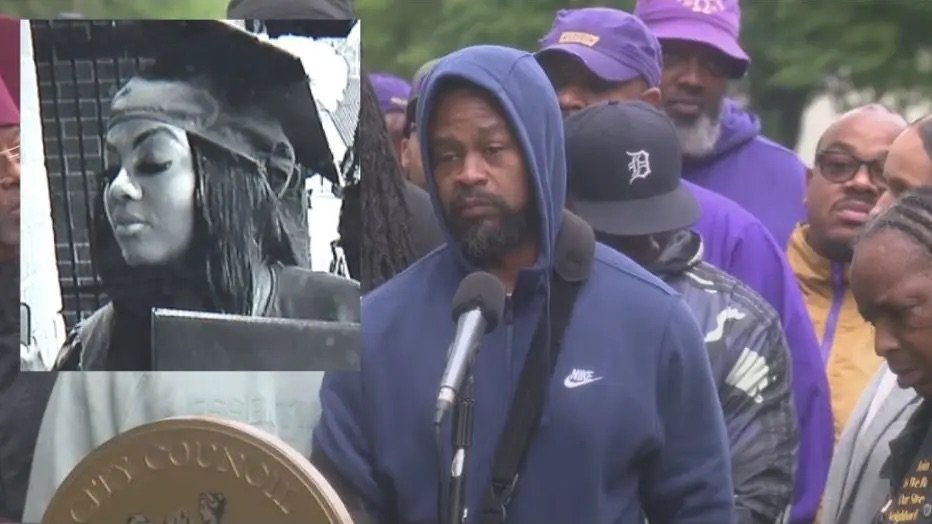
Serious questions
Our community has been shaken by a mass shooting unlike any we have experienced. Early Sunday morning, during the July 4th weekend, 21 people were shot and two were killed, a 20-year-old woman and a 21-year-old man, at a block party on the east side of the city. Nine guns were found at the site and over 100 shell casings were recovered. Over the week 27 people were shot at parties in six separate instances. Since May, the Detroit Police have received 500 calls reporting disturbances.
Community responses reflect deep concerns felt throughout the community:

Stonewall lessons
On June 28, 1969, people in a small, working-class gay bar in New York City rose up against police harassment. The Stonewall Rebellion marks the beginning of the modern queer movement and holds important lessons for us today.
In 1969 to be gay, lesbian, or trans was illegal everywhere but in the state of Illinois. In New York City, queer culture was shaped by the heavy hand of police harassment, subjecting people to physical violence, arrests, and threats, especially in the small bars and clubs that served as gathering places.
But on a hot night in June, at a time when the country was bursting with new political energies, the crowd of mostly young, black, Latinx and white working-class people pushed back, forcing the police to take cover in the bar. For five glorious nights people claimed the streets and the idea of “gay power” was born.

Illusion of control
Our institutions are afraid of us. This fear is driving authoritarian and controlling behaviors, eroding the fragile fabric of our civic life. The decision by the Mayor and the Detroit Police Department to close down 11 public parks during the annual fireworks display has sparked renewed outrage. Once again, we are told “public safety” is the most important thing. And this “safety” can only be achieved by a heavy police presence, scrutinizing people, restricting what they can carry, and where they can go. Getting much less attention than the park closures are reports of check points set up around the downtown area. People were stopped and forced to produce identification, often before being allowed to go to their own homes.
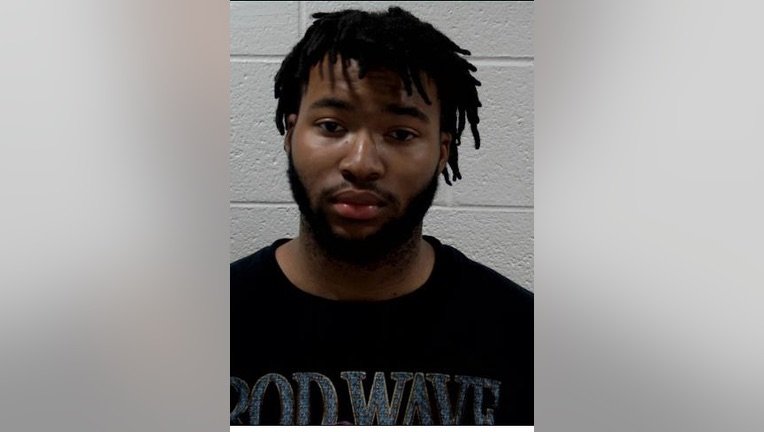
Setting boundaries
The recent tasing by a Detroit police officer of a 10 year old boy has sparked justifiable outrage. The incident at a birthday party was captured by a relative on video, widely circulated on social media, and reported in the mainstream press. It provided some of the context for the renewed demands that the Board of Police Commissioners (BOPC) assume responsibility for putting boundaries on police behavior. The BOPC has fallen woefully short of its oversite obligations. They voted against the recommendation of the police chief to suspend the officer involved without pay.
At this week’s BOPC meeting Congress person Rashida Tlaib helped sharpen the debate around the lack of oversight by the commission. In early June she wrote to the commission saying that the Detroit Police were targeting legal observers who attend demonstrations to protect first amendment rights. Tlaib wrote:
